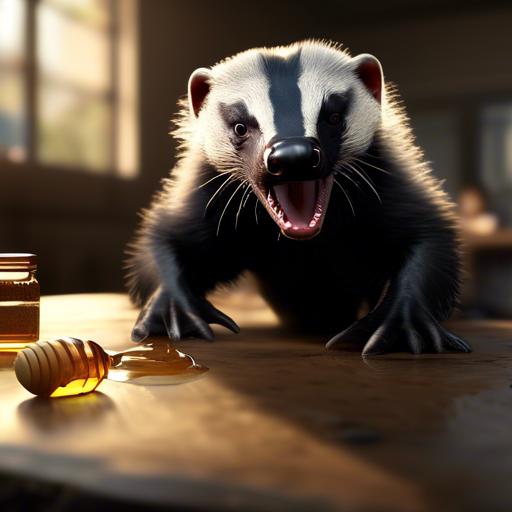there are few animals in the animal kingdom as fearless and ferocious as the honey badger.Known for their tenacious spirit and insatiable appetite, these small creatures have made quite the impression on the wildlife world. Join me as we delve into the world of the honey badger and uncover the mysteries and marvels of this remarkable creature.
– Unveiling the Fearless Nature of the Honey Badger
Honey badgers, also known as the “badasses of the animal kingdom,” are small but fearless creatures that have captured the attention of wildlife enthusiasts and researchers alike. These pint-sized predators may look cute, but don’t let their appearance fool you – they are tenacious and ferocious when it comes to defending themselves and their territory.
One of the most remarkable traits of the honey badger is its fearlessness in the face of danger. These bold creatures have been known to take on animals much larger than themselves, including lions and hyenas, with unwavering courage. Their thick, tough skin helps protect them from bites and stings, allowing them to fearlessly confront any threat that comes their way. With sharp claws and powerful jaws,honey badgers are well-equipped to defend themselves and assert their dominance in the wild.
– The Remarkable Adaptability of the Honey Badger in the Wild
Honey badgers are truly remarkable creatures that have shown incredible adaptability in the wild. These small mammals have earned a reputation for being fearless and tenacious, able to take on animals much larger than themselves. One of the key reasons for their adaptability is their diverse diet, which includes a wide range of foods such as insects, small mammals, birds, reptiles, and even fruits.
Another factor that contributes to the honey badger’s adaptability is its ability to live in a variety of habitats, ranging from savannas and grasslands to forests and deserts. They are also known for their clever problem-solving skills, using their sharp claws and strong jaws to access food sources that other animals might not be able to reach. With such a versatile skillset, it’s no wonder that the honey badger has become one of the most resilient and adaptive animals in the wild.
– Understanding the importance of Conservation Efforts for the Honey Badger
Conservation efforts for the honey badger are crucial in ensuring the survival of this fascinating species. With their fearless nature and unique abilities,honey badgers play a vital role in maintaining the balance of their ecosystems. Here are some reasons why conservation efforts for honey badgers are so important:
- Preservation of biodiversity: Honey badgers are top predators in their environment, helping to control the populations of various species.By protecting honey badgers, we are also preserving the diversity of plants and animals in their habitats.
- Ecological balance: Honey badgers are important in controlling pest populations, such as rodents. Without honey badgers, these pests could wreak havoc on crops and spread disease, leading to potential ecological imbalances.
– Tips for Safely Observing Honey Badgers in their Natural Habitat
When observing honey badgers in their natural habitat, it’s important to prioritize safety for both yourself and the animals. Here are some tips to help you have a successful and respectful wildlife viewing experience:
- Keep a safe distance: Honey badgers are known for their fierce and unpredictable behaviour,so it’s crucial to maintain a safe distance to avoid any potential attacks.
- Observe quietly: Loud noises or sudden movements can startle honey badgers, causing them to feel threatened. Stay calm and observe quietly to not disturb their natural behaviors.
Additionally, it’s important to be aware of your surroundings and be prepared for any unexpected encounters. Remember to respect the wildlife and their habitat during your observation to ensure a positive experience for both you and the honey badgers.
Q&A
Q: Can you tell us about the honey badger?
A: Of course! The honey badger, also known as the ratel, is a fascinating and resilient creature native to Africa and parts of Asia. It is known for its fearlessness and ferocity, despite its small size.
Q: What makes honey badgers unique compared to other animals?
A: Honey badgers are known for their incredible strength and tenacity.They are skilled hunters and scavengers, able to take down prey much larger than themselves. they are also immune to snake venom, which gives them a notable advantage in the wild.Q: Are honey badgers solitary animals or do they live in groups?
A: Honey badgers are usually solitary animals,preferring to roam and hunt alone. Though, they may occasionally form small family groups, particularly during mating season or when caring for young.
Q: What is the diet of a honey badger like?
A: Honey badgers are opportunistic feeders and will eat just about anything they can find. Their diet includes insects, small mammals, birds, eggs, reptiles, and even honey. They are known for their ability to break open beehives to access the flavorful contents inside.Q: are honey badgers endangered?
A: Honey badgers are currently classified as a species of least concern by the IUCN Red List. While they face threats such as habitat loss and human conflict,their adaptability and resilience have helped them thrive in various environments.
Q: Any fascinating facts about honey badgers that readers may not know?
A: One fascinating fact about honey badgers is their ability to reverse the paralysis caused by a snake bite. They can shake off the effects of venom and continue their hunt as if nothing happened. this remarkable adaptation has earned them a reputation as one of the toughest animals in the animal kingdom.
The way Forward
the honey badger’s reputation as a fearless and resilient animal is well-deserved. Through its adaptability, intelligence, and sheer determination, it has proven time and time again that size doesn’t determine strength. Its ability to thrive in some of the harshest environments in the animal kingdom serves as a reminder to never underestimate the power of a determined spirit. So next time you come across a honey badger in the wild, remember to admire its tenacity and unwavering spirit. And perhaps, take a lesson or two from this little creature that never backs down from a challenge.


